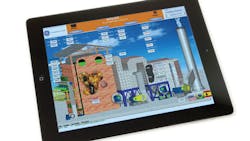In July of this year, GE (IW 500/5) CEO Jeff Immelt travelled to the new GE Energy Storage facility in upstate New York to officially launch the brand's revolutionary molten salt battery line. Just before Immelt delivered his speech on the noisy factory floor, a facility manager pulled out his iPad, punched up the location on the factory map and turned off the overhead fans to clear up the audio.
Amid the fresh, bright white walls of the state-of-the-art plant and in the midst of a product introduction promising to fundamentally change the energy-storage industry, it was that mild trick that captured people’s attention.
See Also: Manufacturing Industry Technology News & Trends
"Things like that always seem to wow people more than the fact that we are able to cram so much energy into a battery cell or transform the industry," joked Randy Rausch, business analyst and manufacturing information leader at GE Energy Storage.
And it’s no wonder.
Wireless technologies are infiltrating the manufacturing environment at an accelerating pace. In their wake, they are fundamentally changing the way factories operate and providing new avenues for lean manufacturing.
Armed with iPads and expanded wireless networks, today's workers are free from the workstation, ready to do far more with far less. And that is a trick that certainly deserves some notice.
The Mobile Revolution
"This is a monumental time for mobility," notes Jim Hilton, senior director of industry solutions for manufacturing at Motorola (IW 500/90). "All of the things we dreamed about when the very first ROI was calculated back in the early '80s—things like automating operations, networks and workstations, the mobilization of the worker, data-capture capabilities and the outbound-data display—are now a reality."
Today's production lines, he explains, are smart tools, enabled with wireless technologies impossible just a few years ago.
Aspen InfoPlus.21 Mobile optimizes operating and business performance through real-time access to critical manufacturing data that can be quickly analyzed and visualized to identify and correct manufacturing issues from anywhere.
"These days, production is connected straight to the network so if a line starts to go out of compliance for whatever reason—if the oven chambers are down, some of the robotics are starting to have trouble or if there's a memory leak in the software—an alert goes out from the machine directly to the appropriate people to tell them it may have a problem in the future," he explains.
This way, he says, fixes and repairs become preventative maintenance, not reactive patches. As a result, quality-control capabilities are expanding exponentially as employees gain real-time access to real-time data.
A New Standard of Quality
Manufacturing the high-energy, ultralong-life Durathon batteries at GE Energy Storage requires workers to have access to enormous amounts of data at all times to maintain the precise, fine-grain control of the equipment, environment and process its production requires.
According to Rausch, the molten salt batteries contain ceramic components that require very particular conditions for proper manufacture. Any dip in kiln temperature or tick in humidity can disrupt or ruin a lot.
To maintain its parameters, GE collects 10,000 variables in the manufacturing environment about four times per second, providing enough data to tell managers exactly what serial number of what lot from what vendor was mixed at what temperature by which operator at what time, and delivers that information to the users when and where they need it.
"With information like that, it is easy to see anomalies in normal operation," explains Rausch. "We have a birth history report of every component and piece and battery we make."
The Wireless Mantra
This is the mantra of the mobile-connected factory: Information where you need it when you need it. Fulfilling that call is fundamentally changing factory life.
"To be successful, we have invested quite a bit in the ability to control our manufacturing process and the mobility gives us that real-time view into all of the data," Rausch notes. "That data is available right at the fingertips of the line-level supervisors and the people who can make the decisions on the floor."
Using basic wifi iPads equipped with the free application tied to its ProficySCADA manufacturing execution system, GE Energy Storage has developed a system to get the right info to the right people to catch anomalies in the system and take control over the environment for a negligible cost and zero additional effort. Doing so has also enabled its workers to achieve new levels of efficiency.
"We have been able to get a lot more work done with the same number of employees because we didn't have to have one of our factory workers camped out in front of a machine watching data," Rausch says. "Now we can put that machine's status in a technician's hands wherever he goes, so instead of having to put three people on different screens across the plant, you can have one person watch them all wherever he is."
The New Lean
According to Mark Bernardo, product general manager at GE Intelligent Platforms, this all comes down to lean manufacturing—albeit a new, high-tech manifestation of lean.
"Lean is all about eliminating waste in the process, eliminating steps in the manufacturing process," he explains. "One of the ways you do that is making sure that the information is finding the people that need it when they need it, regardless of where they are and making that information actionable."
This, he says, is exactly what mobility offers.
"Mobility is one main aspect of the whole lean manufacturing scene," he argues. "That's the interesting thing. With mobility, people are embracing the concept of lean without ever actually using the word."
About the Author
Travis M. Hessman
Editor-in-Chief
Travis Hessman is the editor-in-chief and senior content director for IndustryWeek and New Equipment Digest. He began his career as an intern at IndustryWeek in 2001 and later served as IW's technology and innovation editor. Today, he combines his experience as an educator, a writer, and a journalist to help address some of the most significant challenges in the manufacturing industry, with a particular focus on leadership, training, and the technologies of smart manufacturing.

